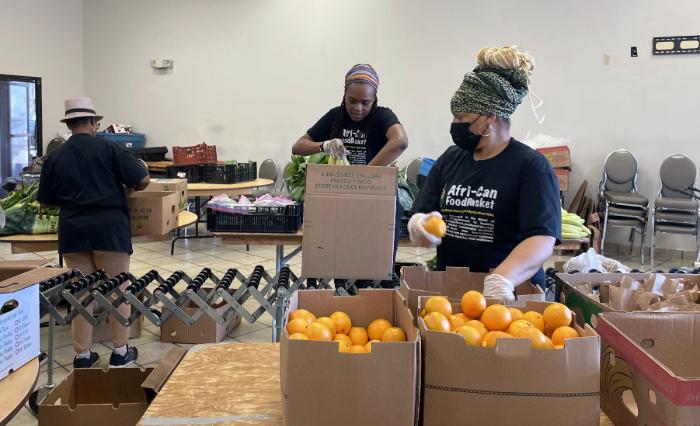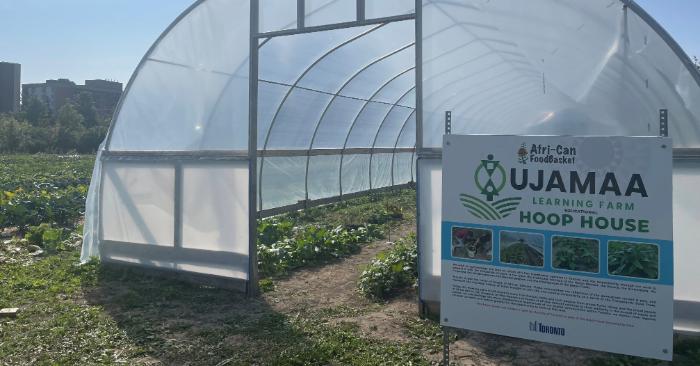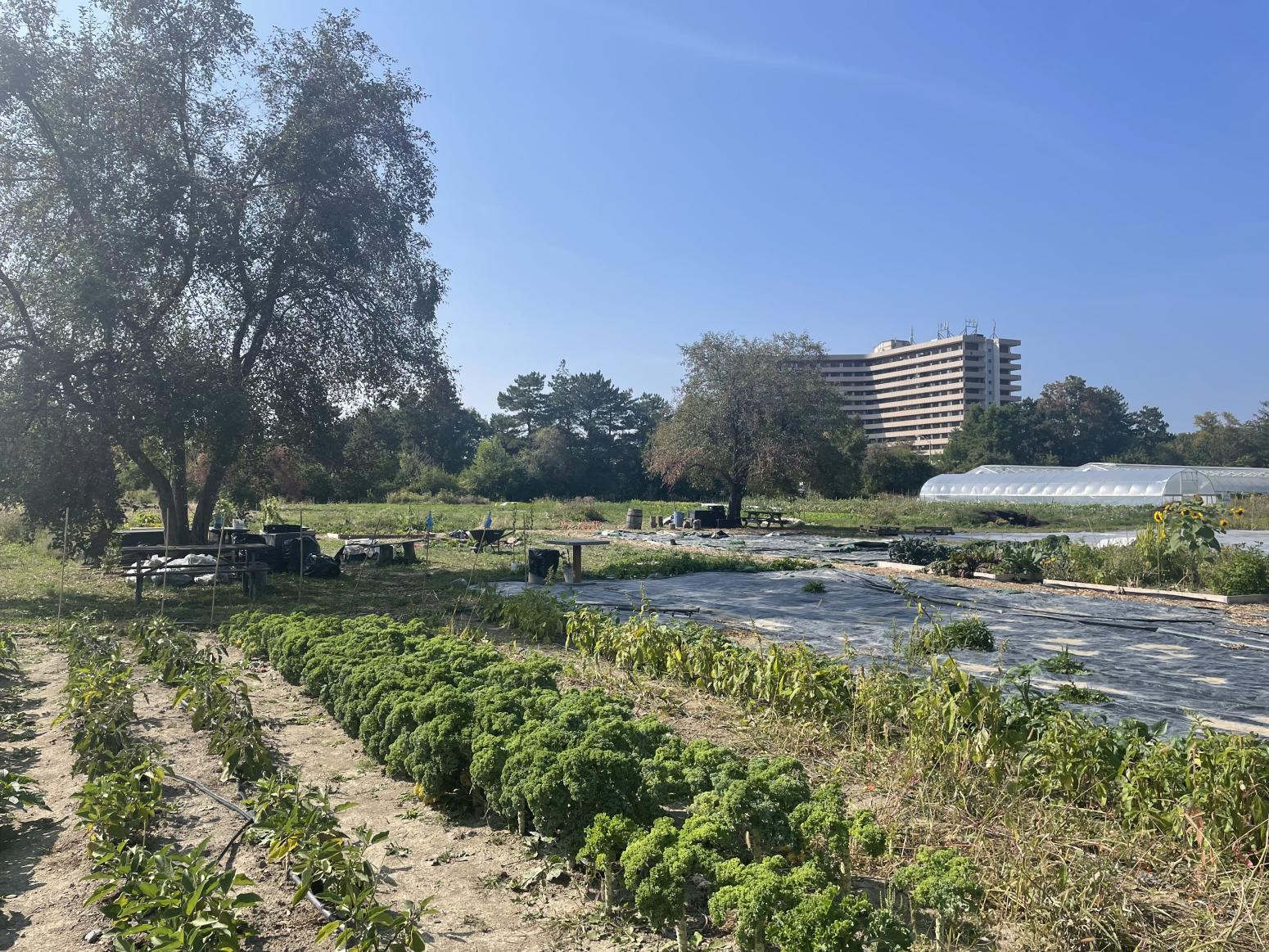Afri-Can FoodBasket: promoting cultural food access and food sovereignty within TCHC communities
A Black-owned non-profit social organization that's been at the forefront of championing food justice and food sovereignty for Toronto's African and Caribbean community since 1995.
This article is part of a series that highlights the importance of food security partners, programs, and initiatives in contributing to the overall health and wellbeing of TCHC communities. Read and view other articles and videos in this series.
Walking into the Afri-Can FoodBasket warehouse in the northwest end of Toronto, we could feel the energy in the room as volunteers moved swiftly to fill cardboard boxes with a variety of culturally-appropriate fruits and vegetables. This was food distribution day, and the warehouse was a hive of activity, with food being sorted by type and laid out onto tables. Volunteers were husking corn, dividing callaloo and squash into bundles, and organizing the next set of boxes that needed to be filled. Zakiya Tafari, Executive Director, had invited us to the warehouse to see for ourselves the many helping hands it took to get fresh cultural food out the door and into TCHC communities. Amid all the busyness, Zakiya sat down with us to talk about Afri-Can FoodBasket and why the work he does is important.
Afri-Can FoodBasket was founded in 1995 by Zakiya’s parents, Anyika Tafari (who goes by “Tafari”) and Anan Lololi. Naturally, Zakiya wanted to continue their work as part of his family’s legacy in the areas of food security. However, he also wanted to make his own mark by making food more accessible to the Black community and giving people the knowledge to grow food themselves. He believes that by providing access to healthier culturally appropriate foods, better socio-economic outcomes are created, resulting in food justice, health, and social enterprise.
One of Zakiya’s mainstays is that food is medicine. He knows the health benefits of eating nutritiously and what it can do for one’s wellbeing. He also wants more attention paid to food literacy and the science connected to it. As a result, he has been strategic in the types of foods they pack for the community, “We're putting into our food boxes, things like lemons, limes, ginger, more garlic that will help boost your immune system as we're going into the winter. Ultimately, we want to give people things that will help them increase their health and wellbeing.” Introducing healthy eating habits at an early age helps to instill a lifelong way of thinking. He explains that “our biggest reason for putting fruit into boxes is that we want to see children getting their vitamin C directly out of oranges, as opposed to wondering how to supplement it down the road.”

Afri-Can FoodBasket: packing fruit boxes for delivery to TCHC communities
Zakiya’s mother, Tafari, is motivated by the need to reduce disparities in cultural food distribution. “Food justice is something we are still working on. A lot of food that Caribbean people eat costs more than anything else in the grocery store. It's really sad to see that these communities have to commit the most money for culturally specific food,” she said. Zakiya’s father, Anan, also expresses a similar sentiment, “we purchase the most expensive foods because our foods come from Africa, South America, and the Caribbean. If you go into a supermarket, you’ll find that yams, sweet potato and cassava are the most expensive.” To them that is unfair; food that is central to their culture should be made affordable and accessible. To solve this issue, both Tafari, Zakiya and Anan, see the importance of food sovereignty, which includes the need to be self-reliant and educated in urban farming.
For this part of the interview and to understand what Zakiya means by food sovereignty, he takes us to the Ujamaa Learning Farm. The one acre urban farm is a hidden enclave not too far from Jane and Finch, surrounded by apartment buildings and hydro towers in the distance. We walk by rows upon rows of kale, callaloo, tomatoes and cucumbers and even spot some bok choy. Zakiya points to a covered structure, “with support from the City of Toronto's Confronting Anti-Black Racism Unit, we just opened a 100 by 20-foot hoop house, which we're using as an educational space to grow cultural foods like callaloo, kale or tomatoes.” He continues “we are also looking at it being an educational space where individuals from schools and the community can come in and learn about long-term growing, learn how this hoop house extends our growing season and makes it easier for us to cultivate such crops.”

Ujamaa Learning Farm Hoop House
Food sovereignty is also about cultural respect and addressing inequalities in the food system. Zakiya’s father, Anan, explains that food sovereignty goes beyond food security and is about people making the decisions and giving them the tools to take control of their own food systems. He believes that if people learn to feed themselves, this will lessen crime and reduce the need for healthcare. Anan looks toward leadership development within the community as a solution. “We see a lot of young leadership in these communities. When I see them on Facebook, I feel so good because I see the effect of the work that we did. That is food sovereignty” he said.
Educating the public is a big aspect of their intentions with the farm and training the next generation of urban farmers. Zakiya shares that the goal is to one day open a Black food hub, a reimagined version of a food bank but one that is culturally specific. They are hoping that by working with the City of Toronto they can secure space for one. In the meantime, they run a Food as Medicine program, teaching seniors about food, nutrition and health, and the Black Food Access Program, which focuses on increasing cultural food access to those facing challenges. What Zakiya really wants to impart on those who visit the farm though is an appreciation for the effort it takes to grow food. “When I go to the grocery store and I see a mountain of tomatoes, I know how much water goes into that. I appreciate food in a different way because I know what goes into it and I want to help more people have that appreciation.” Tafari shared with us a story of a volunteer who now sees food in a different way after coming to the farm. She said the volunteer doesn’t overeat and waste food anymore. To Tafari, that change in behaviour is one way to affirm that what they are doing is working, “If I don’t get a paycheck that week and I get this one outcome, I’m happy, I made a difference.”
You can learn more about Afri-Can FoodBasket and the programs they offer on the Afri-Can FoodBasket website.
Afri-Can FoodBasket: promoting cultural food access and food sovereignty within TCHC communities

